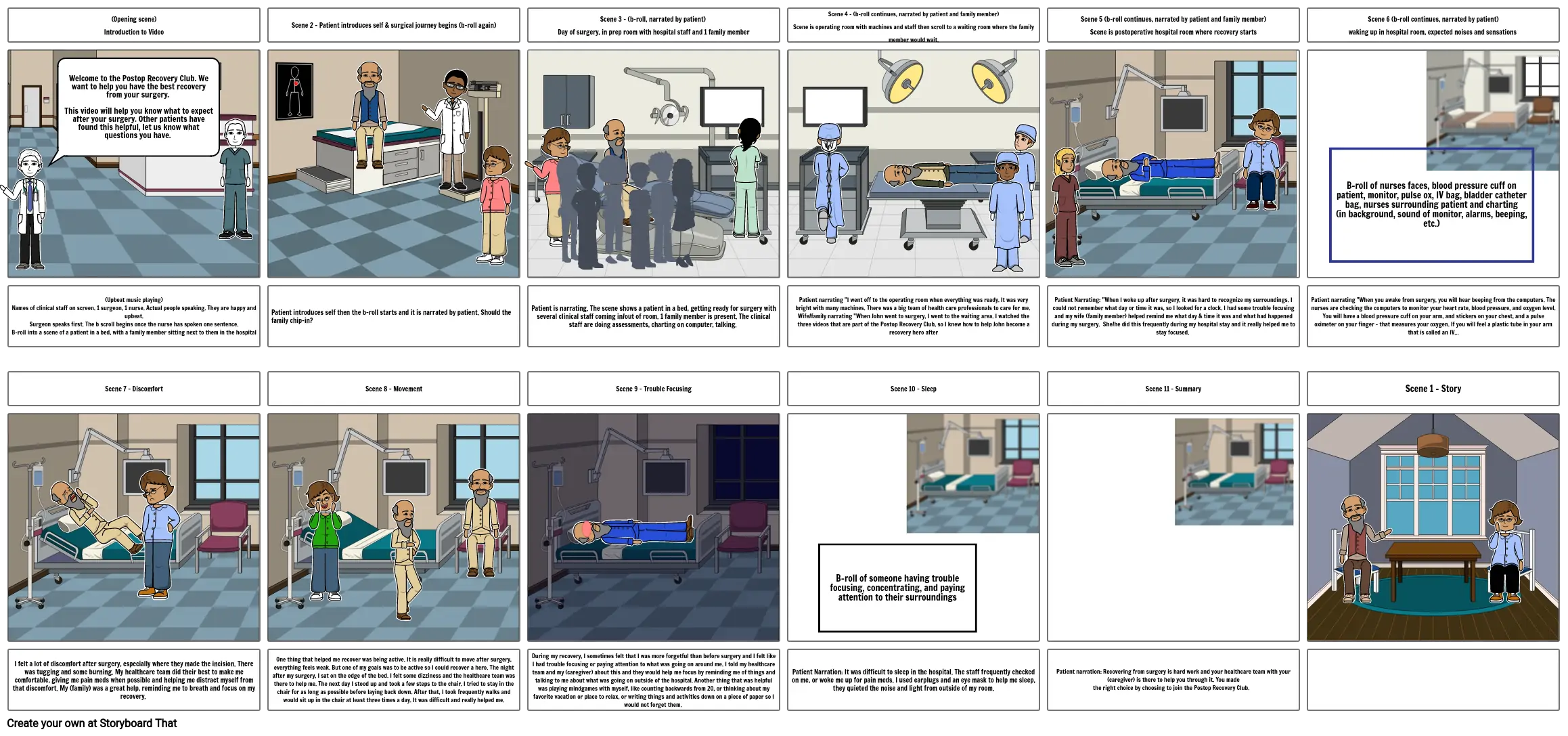Preop video for delirium prevention

Storyboard Description
1st storyboard, 8/2/2019
Storyboard Text
- (Opening scene)Introduction to Video
- Welcome to the Postop Recovery Club. We want to help you have the best recovery from your surgery. This video will help you know what to expect after your surgery. Other patients have found this helpful, let us know what questions you have.
- Scene 2 - Patient introduces self & surgical journey begins (b-roll again)
- Scene 3 - (b-roll, narrated by patient) Day of surgery, in prep room with hospital staff and 1 family member
- Scene 4 - (b-roll continues, narrated by patient and family member)Scene is operating room with machines and staff then scroll to a waiting room where the family member would wait.
- Scene 5 (b-roll continues, narrated by patient and family member)Scene is postoperative hospital room where recovery starts
- Scene 6 (b-roll continues, narrated by patient)waking up in hospital room, expected noises and sensations
- B-roll of nurses faces, blood pressure cuff on patient, monitor, pulse ox, IV bag, bladder catheter bag, nurses surrounding patient and charting(in background, sound of monitor, alarms, beeping, etc.)
- (Upbeat music playing)Names of clinical staff on screen. 1 surgeon, 1 nurse. Actual people speaking. They are happy and upbeat.Surgeon speaks first. The b scroll begins once the nurse has spoken one sentence.B-roll into a scene of a patient in a bed, with a family member sitting next to them in the hospital
- Scene 7 - Discomfort
- Patient introduces self then the b-roll starts and it is narrated by patient. Should the family chip-in?
- Scene 8 - Movement
- Patient is narrating. The scene shows a patient in a bed, getting ready for surgery with several clinical staff coming in/out of room. 1 family member is present. The clinical staff are doing assessments, charting on computer, talking.
- Scene 9 - Trouble Focusing
- Patient narrating "I went off to the operating room when everything was ready. It was very bright with many machines. There was a big team of health care professionals to care for me. Wife/family narrating "When John went to surgery, I went to the waiting area. I watched the three videos that are part of the Postop Recovery Club, so I knew how to help John become a recovery hero after
- Scene 10 - Sleep
- Patient Narrating: "When I woke up after surgery, it was hard to recognize my surroundings. I could not remember what day or time it was, so I looked for a clock. I had some trouble focusing and my wife (family member) helped remind me what day & time it was and what had happened during my surgery. She/he did this frequently during my hospital stay and it really helped me to stay focused.
- Scene 11 - Summary
- Patient narrating "When you awake from surgery, you will hear beeping from the computers. The nurses are checking the computers to monitor your heart rate, blood pressure, and oxygen level. You will have a blood pressure cuff on your arm, and stickers on your chest, and a pulse oximeter on your finger - that measures your oxygen. If you will feel a plastic tube in your arm that is called an IV...
- Scene 1 - Story
- I felt a lot of discomfort after surgery, especially where they made the incision. There was tugging and some burning. My healthcare team did their best to make me comfortable, giving me pain meds when possible and helping me distract myself from that discomfort. My (family) was a great help, reminding me to breath and focus on my recovery.
- One thing that helped me recover was being active. It is really difficult to move after surgery, everything feels weak. But one of my goals was to be active so I could recover a hero. The night after my surgery, I sat on the edge of the bed. I felt some dizziness and the healthcare team was there to help me. The next day I stood up and took a few steps to the chair. I tried to stay in the chair for as long as possible before laying back down. After that, I took frequently walks and would sit up in the chair at least three times a day. It was difficult and really helped me.
- During my recovery, I sometimes felt that I was more forgetful than before surgery and I felt like I had trouble focusing or paying attention to what was going on around me. I told my healthcare team and my (caregiver) about this and they would help me focus by reminding me of things and talking to me about what was going on outside of the hospital. Another thing that was helpful was playing mindgames with myself, like counting backwards from 20, or thinking about my favorite vacation or place to relax, or writing things and activities down on a piece of paper so I would not forget them.
- Patient Narration: It was difficult to sleep in the hospital. The staff frequently checked on me, or woke me up for pain meds. I used earplugs and an eye mask to help me sleep, they quieted the noise and light from outside of my room.
- B-roll of someone having trouble focusing, concentrating, and paying attention to their surroundings
- Patient narration: Recovering from surgery is hard work and your healthcare team with your (caregiver) is there to help you through it. You madethe right choice by choosing to join the Postop Recovery Club.
-
Over 30 Million Storyboards Created
No Downloads, No Credit Card, and No Login Needed to Try!
